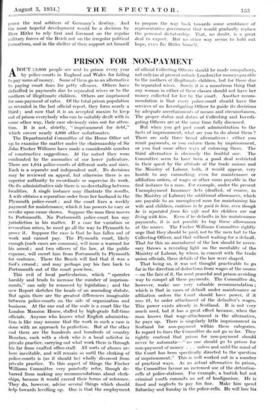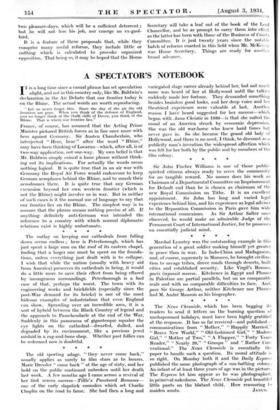PRISON FOR NON-PAYMENT
ABOUT '20,000 people are sent to prison every year by police-courts in England and Wales for failing to pay sums of money. Some of them go as an alternative to paying court fines for petty offences. Others have defaulted in payments due to separated wives or to the mothers of illegitimate children. Others are imprisoned for non-payment of rates. Of the total prison population as revealed in the last official report, they form nearly a third ; and now that it is an accepted maxim to keep out of prison everybody who can be suitably dealt with in some other way, their case obviously cries out for atten- tion. It is not, strictly, "imprisonment for debt," which covers nearly 4,000 other unfortunates.
The Departmental Committee of the Home Office set up to examine the matter under the chairmanship of Sir John Fischer Williams have made a considerable number of constructive suggestions. At the outset they were confronted by the anomalies of our lower judicature. There are 1,044 police-courts of different sorts and sizes. Each is a separate and independent unit. Its decisions may be reviewed on appeal, but otherwise there is no superior authority to co-ordinate or supervise its work. On its administrative side there is no dovetailing between localities. A single-instance may illustrate the results. A wife obtains a separation order from her husband in the Plymouth police-court ; and the court fixes a weekly payment for maintenance, which it has powers to vary or revoke upon cause shown. Suppose the man then moves to Portsmouth. No Portsmouth police-court has any jurisdiction in his matter. If a case for variation or revocation arises, he must go all the way to Plymouth to prove it. Suppose the ease is that he has fallen out of work and cannot pay. The Plymouth court, likely enough (such cases are common), will issue a warrant for his arrest ; and two officers of the law, at the public expense, will escort him from Portsmouth to Plymouth for sentence. There the Bench will find that it was a fool's errand ; and may perhaps pay his fare back to Portsmouth out of the court poor-box.
This evil of local particularism, which "operates harshly and tends to increase the number of imprison- ments," can only be removed by legislation ; and the new Report sketches the heads of an amending statute. But again there are the greatest differences imaginable between police-courts on the side of organization and business. At the one end of the scale is a court like the London Mansion House, staffed by high-grade full-time officials. Anyone who knows what English administra- tion is like may assume that the work in such a case is done with an approach to perfection. But at the other end there are the hundreds and hundreds of country Benches, each with a clerk who is a local solicitor in private practice, carrying out what work there is through his far from exalted office-staff. All sorts of abuses are here inevitable, and will remain so until the clerking of police-courts is (as it should be) wholly divorced from private practice. To this aspect of things the Fischer Williams Committee very pointedly refer, though de- barred from making any recommendations about clerk- ships, because it would exceed their terms of reference. They do, however, advise several things which should help towards levelling up. One is that the employment of official Collecting Officers should be made compulsory, not only (as at present outside London) for moneys payable to the mothers of illegitimate children, but for those due to separated wives. Surely it is a monstrous thing that any woman in either of these classes should not have her mioney collected for her by the court: Another recom, rnendation is that every police-court should have the services of- an Investigating Officer to guide its decisions by adequate aseertainments of means and circumstances. The proper status and duties of Collecting and Investi- gating Officers are at the same time fully discussed.
But when you get past court administration to the facts of imprisonment, what are you to do about them ? .There are only three broad alternatives : either you -remit payments, or you enforce them by imprisonment, or you find some other ways of enforcing them. The third alternative is obviously the fruitful one. The Committee seem to have been a good deal restricted in their quest by the attitude of the trade unions and the Ministry of Labour. both, it would appear, very hostile to any earmarking, even for maintenance or affiliation orders, of wages or other sums payable in the first instance to a man. For example, under the present Unemployment Insurance Acts (drafted, of course, in the Ministry of Labour) the additional allowances, which are payable to an unemployed man for maintaining his wife and children, continue to be paid to him, even though he is separated from his wife and his children are not living with him. Even if he defaults in his maintenance payments, it is not possible to tap these allowances at the source. The Fischer Williams Committee rightly urge that they should be paid, not to the men but to the Collecting Officer, and that without waiting for a default. That for this an amendment of the law should be neces- sary throws a revealing light on the mentality of the Ministry of Labour, by whom, in concert with the trade union officials, these details of the law were shaped.
That being so, it was not thought practicable to go far in the direction of deductions from wages at the source —on the face of it, the most peaceful and prison-avoiding way to compel all these payments. The Committee do, however, make one very valuable recommendation ; which is that in cases of default under maintenance or affiliation orders the Court should have power, if it sees fit, to order attachment of the defaulter's wages. This power exists already in Scotland. It is not very much used, but it has a great effect because, when the man knows that wage-attachment is the alternative, he pays up. There is singularly little imprisonment in Scotland for non-payment within these categories. In regard to fines the Committee do not go so far. They rightly contend that prison for non-payment should never be automatic—" no one should go to prison for non-payment of money . . . unless and until the mind of the Court has been specifically directed to the 'question of imprisonment." This is well worked out in -a number of practical ways. As an actual alternative to prison, the Committee favour an increased use of the detention- cells at police-stations. For example, a loutish but not criminal youth commits an act of hooliganism. He is fined and neglects to pay his fine. Make him spend Saturday and Sunday in the police-cells, He will lose his two pleasure-days, which will be a sufficient deterrent ; but he will not lose his job, nor emerge an ex-gaol- bird.
It is a feature of these proposals that, while they comprise many useful reforms, they include little or nothing which is calculated to provoke organized opposition. That being so, it may be hoped that the Home Secretary will take a leaf out of the. book of the Lord Chancellor, and be as prompt to carry them into effect as the latter has been with those of the Business of Courts Committee. It is just twenty years since the notable batch of reforms enacted in this. field when Mr. McKenna was Home Secretary. Things are ready for another broad advance.































 Previous page
Previous page